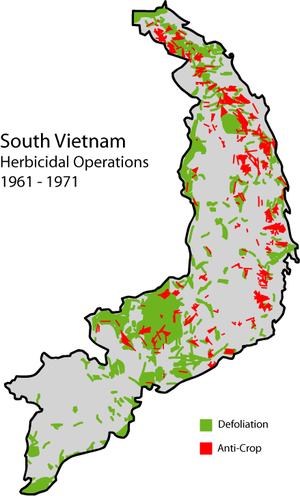Operation Ranch Hand
| date | 1962 to 1971 |
|---|---|
| place | Vietnam |
| output | Defoliation and crop failures |
| consequences | Forest dieback , drastically increased incidence of severe malformations in children, cancer and immune deficiencies |
Operation Ranch Hand was the biggest operation of the US military during the Vietnam War for the application of herbicides . In the years 1962 to 1971, defoliants such as Agent Orange were applied by airplanes in order to be able to better observe enemy movements in the jungle . After the first spray flights had little effect, the Military Assistance Command, Vietnam ordered stronger wording . The operation was later expanded to include food plantations to starve the enemy and force the South Vietnamese into internment camps . In 1969, half of the arable land was sprayed. In the following projects, Operation Sherwood Forest and Operation Pinky Rose , incendiary bombs were dropped on the dried-up plants in order to deliberately trigger firestorms .
mascot
The slogan “Only you can prevent a forest!” Probably goes back to a joke by a soldier who modified a poster of the United States Forest Service . The mascot “ Smokey Bear ”, well known after the Second World War, was part of a campaign to prevent forest fires through careless use of fire sources. The posters were hung in the training areas at Langley Air Force Base , Virginia, Eglin Air Force Base , Florida, and Bien Hoa Air Base , Vietnam in the late 1965s .
The Douglas C-47s and other light aircraft were nicknamed "Smokey Bears" by pilots. Their task was to mark enemy positions and defoliated forests with smoke grenades or signal rockets . One dangerous event in which the smoke bomb accidentally stayed in the plane and stole the pilot's view was called "Smokey the Bear".
criticism
As early as 1964, the Federation of American Scientists criticized the use of herbicides . She warned that the US was using the war to test chemical and biological warfare . In addition, both fighters and the civilian population were affected by the measures. A year later, a petition was presented to the president's science advisor, which by then 5,000 scientists, including 17 Nobel Prize winners , had signed. The National Academy of Sciences also put pressure on President Johnson , fearing it would lower the moral barrier to using deadly chemical weapons . The program was finally canceled after a study in the autumn of 1969 linked the component 2,4,5-T of the Agent Orange formulation in animal experiments with malformations and stillbirths, which were also more common in the region.
consequences
About a tenth of the trees that were sprayed died. The deforestation took place in the areas that were sprayed several times to 50-80%. Due to the warm climate, the leaves were composted very quickly . Due to heavy rainfall in the area, the nutrients were washed out of the soil and lost. It took several decades for the nutrient levels in the soil to recover. At first there was mainly silver hair grass and bamboo . As a result, primary production was greatly reduced. Centuries will pass before the old growth is restored. The effects on the mangrove forest were completely different: Instead of defoliation, the plant community died off completely, as they are much more sensitive to the use of herbicides with hormone properties . Cover and food were lost not only to the fighters of the NFB , but also to the animal population. In total, 20% of the mangroves were completely destroyed. From an economic point of view, 47 million m³ of tradable timber was destroyed. The economic damage to underdeveloped South Vietnam is estimated at $ 500 million. The main exports rice and rubber were also affected, as the forests provided groundwater for rice cultivation and rubber tree plantations .
In addition, there has been and continues to be a drastically increased incidence of severe malformations in children, cancer diseases and immunodeficiencies (see also: Agent Orange # damage and problems to date ).
Individual evidence
- ^ A b c James G. Lewis: James G. Lewis on Smokey Bear in Vietnam . In: Environmental History . tape 11 , no. 3 , July 2006, p. 598-603 , doi : 10.1093 / envhis / 11.3.598 .
- ↑ Major William A. Buckingham, Jr .: Operation Ranch Hand. The Air Force and Herbicides in Southeast Asia, 1961-1971 . 1982 ( online ).
- ^ Arthur H. Westing: Ecological Effects of Military Defoliation on the Forests of South Vietnam . In: BioScience . tape 21 , no. September 17 , 1971, p. 893-898 , doi : 10.2307 / 1295667 .

